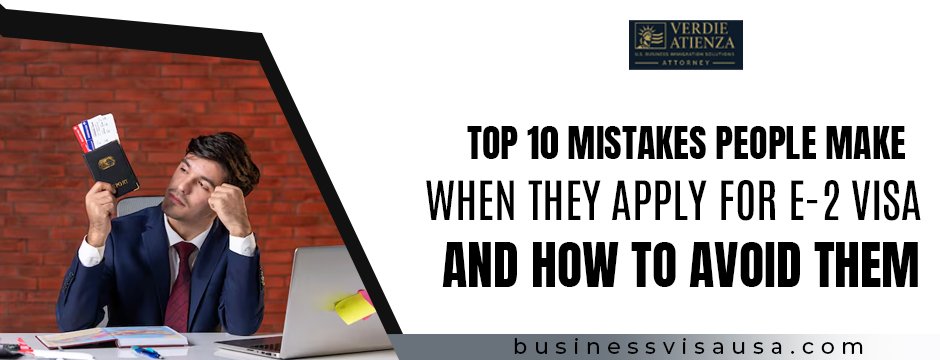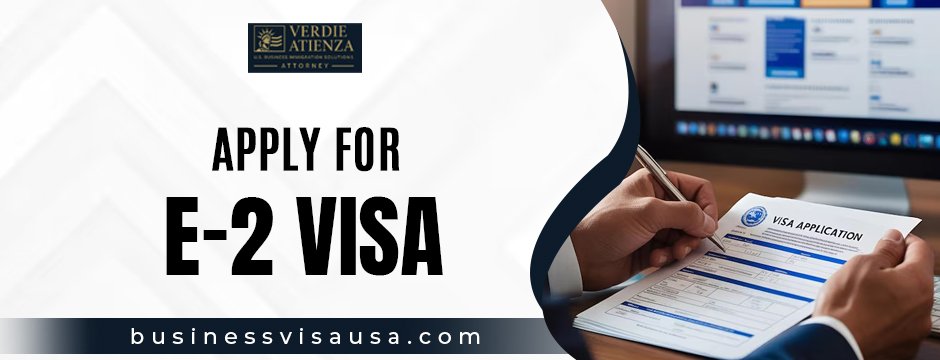Top 10 Mistakes People Make When They Apply for E-2 Visa and How to Avoid Them

Applying for an E-2 visa seems simple on the surface. You invest in a U.S. business, fill out a few forms, and wait for approval. However, in reality, many people hit unexpected roadblocks. These mistakes are often small but can lead to big setbacks or even rejections. Whether you’re an investor with a detailed plan or just getting started, understanding what can go wrong is key. Being prepared helps things move faster and reduces stress. In this blog, we’ll go through the most common mistakes people make when they apply for E-2 visa. We’ll also explain how to avoid these issues in a clear, practical way. With the right approach, you’ll save time and boost your chances of success. So let’s break it all down and help you get things right from the beginning.
1. Not Understanding the E-2 Visa Requirements
One of the biggest mistakes people make is not knowing what the E-2 visa really requires. It’s not just about having money to invest. You also need to show that your funds come from a legal source, that your business is real and active, and that your investment is enough to make it work. Missing just one of these parts can lead to problems. Some people rush in thinking they only need to spend money. But immigration officers look at the full picture. So, before you apply, take time to understand every rule. Read the official guidelines and talk to people who’ve been through the process. The better you understand the requirements, the stronger your application will be.
2. Investing Too Little in the Business
Another common mistake is under-investing. Many people try to keep their costs low. But the E-2 visa isn’t about doing the bare minimum. The amount you invest should be enough to show you’re serious about making the business work. There’s no set dollar amount, but your investment should cover all key expenses. That includes equipment, rent, staff, and more. If your business looks too small or cheap, it may not be seen as strong or viable. So, before you apply for E-2 visa, review your budget carefully. Ask yourself if your investment really shows commitment. If it doesn’t, consider increasing your spending to match the needs of your business. A solid investment often leads to a stronger case.
3. Choosing the Wrong Business Type
Not every business is a good match for the E-2 visa. Some people pick a type of business just because it’s cheap or easy to set up. But that can lead to problems. The business should be able to grow, hire staff, and make a real impact in the local economy. A business that’s too small or passive may not qualify. For example, owning a few rental properties or doing freelance work alone may not be enough. So think about what your business can really do. Can it grow? Can it create jobs? Will it add value to the U.S. economy? These are the kinds of questions the visa officers ask. Choosing the right business from the start can save you a lot of trouble later.
4. Not Proving the Source of Funds Clearly
When you apply for E-2 visa, you must show exactly where your money came from. This is one area where many people get stuck. You can’t just say the money is yours. You need documents—like bank statements, tax returns, or sale contracts—to prove it. If your funds came from a gift or loan, you need to show where that came from too. If anything is unclear or missing, your application may be delayed or denied. Think of it like this: the visa officer wants to know your money is clean and traceable. So gather all your documents early. Organize them well. Make sure everything matches your story. This step takes time, but it’s worth it. Clear proof builds trust.
5. Submitting a Weak Business Plan
Your business plan isn’t just a formality. It’s one of the most important parts of your E-2 visa application. Many people make the mistake of writing a basic or vague plan. But immigration officers want details. They want to see how your business will run, how much you’ll earn, and how you’ll create jobs. A strong plan shows that you’ve done your homework. It also shows that your business has a future. Include things like financial forecasts, marketing strategies, and staff planning. Use real numbers, not just guesses. If writing isn’t your strength, get help from someone with experience. A clear, detailed plan can make a big difference. It shows that you’re ready and serious.
6. Waiting Too Long to Apply
Timing matters a lot. Some people wait too long before they apply. They spend too much time getting things “perfect” and miss key deadlines. Others make the mistake of starting the process after arriving in the U.S. on a different visa, which can cause confusion. If you plan to apply for E-2 visa, it’s better to start early. That gives you time to fix problems, gather documents, and prepare a strong case. Rushing at the last minute only leads to stress and mistakes. Planning ahead also gives you time to talk to experts and avoid legal trouble. The earlier you start, the smoother things tend to go.
7. Ignoring the Need for an Active Role
Many applicants think they can invest money and then take a step back. But the E-2 visa requires more than just funding. You must take an active role in running the business. That means being part of daily operations, making decisions, and managing staff. Simply being an investor without involvement may hurt your case. Some people fail to show how they’ll be involved. That’s a red flag to visa officers. So, in your application and business plan, explain your role clearly. Show how your skills match the needs of the business. Make it clear that you’re not just an owner—you’re a key part of the team.
8. Not Planning for Job Creation
The E-2 visa doesn’t require a set number of jobs, but job creation is still important. If your business doesn’t plan to hire anyone, it may seem too small. Some people forget this part and focus only on profits. But hiring staff shows your business helps the local economy. It also proves your business is real and growing. So if you’re getting ready to apply for E-2 visa, think about when and how you’ll bring people on board. Will you hire part-time or full-time? What roles do you need? Add this to your business plan. Mention it in your visa paperwork too. The more clearly you plan to create jobs, the stronger your case becomes.
9. Applying Without Enough Legal Support
Filing for an E-2 visa involves more than filling out a form. There are rules, documents, and procedures that can get tricky. Some people try to handle everything alone. Others hire someone who isn’t familiar with E-2 cases. Both can lead to mistakes. It’s important to have legal help from someone who knows this visa type well. A good lawyer can spot issues, guide your choices, and help you avoid problems. If you’re serious about your business, it makes sense to invest in the right support. Mistakes in your application can lead to delays—or worse, denial. Having expert help gives you peace of mind.
10. Overlooking the Renewal Process
Getting the E-2 visa is just the first step. You also need to keep it. Many people forget about the renewal process. They focus so much on how to apply for E-2 visa and get approved that they don’t plan for what comes next. Even a quick E-2 visa free consultation can help you think ahead. To renew your visa, you must show your business is still active and doing well. That means keeping good records, paying taxes, and following your business plan. You also need to update the government on your progress. If your business isn’t doing what you promised, your renewal might be denied. So, think long term. Plan for success beyond just the first approval. Keep your business strong, and stay ready for future checks.

How to Avoid These Common E-2 Visa Mistakes
Avoiding mistakes starts with preparation. First, take time to understand all the E-2 visa requirements, especially if you’re trying to figure out how to qualify for E-2 visa successfully. Don’t rush. Make sure your investment is enough and well-documented. Choose a business that fits the rules and has room to grow. Build a clear, realistic business plan that shows your goals and how you’ll reach them. Keep ownership and control simple and easy to prove. Apply when everything is in place, and practice for your consular interview. After approval, continue to follow the visa terms and plan for renewals. Most importantly, always check the latest rules and avoid unverified advice. Each of these steps makes your case stronger.
Conclusion
Avoiding mistakes when you apply for E-2 visa can make the difference between success and delay. These errors often seem small, but they can lead to major problems. By staying informed and planning ahead, you give yourself the best shot. From choosing the right business to preparing for renewal, every step counts. Make sure your documents are in order, your plan is solid, and your role is active. If you want guidance, Business Visa USA offers reliable support to help you move forward. Take the next step with confidence and turn your business goals into reality.